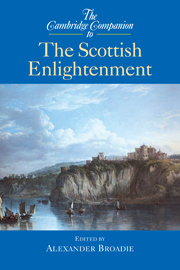Book contents
- Frontmatter
- Introduction
- 1 The contexts of the Scottish Enlightenment
- 2 Religion and rational theology
- 3 The human mind and its powers
- 4 Anthropology: the ‘original’ of human nature
- 5 Science in the Scottish Enlightenment
- 6 Scepticism and common sense
- 7 Moral sense and the foundations of morals
- 8 The political theory of the Scottish Enlightenment
- 9 Economic theory
- 10 Natural jurisprudence and the theory of justice
- 11 Legal theory
- 12 Sociality and socialisation
- 13 Historiography
- 14 Art and aesthetic theory
- 15 The impact on Europe
- 16 The impact on America: Scottish philosophy and the American founding
- 17 The nineteenth-century aftermath
- Select bibliography
- Index
Introduction
Published online by Cambridge University Press: 28 May 2006
- Frontmatter
- Introduction
- 1 The contexts of the Scottish Enlightenment
- 2 Religion and rational theology
- 3 The human mind and its powers
- 4 Anthropology: the ‘original’ of human nature
- 5 Science in the Scottish Enlightenment
- 6 Scepticism and common sense
- 7 Moral sense and the foundations of morals
- 8 The political theory of the Scottish Enlightenment
- 9 Economic theory
- 10 Natural jurisprudence and the theory of justice
- 11 Legal theory
- 12 Sociality and socialisation
- 13 Historiography
- 14 Art and aesthetic theory
- 15 The impact on Europe
- 16 The impact on America: Scottish philosophy and the American founding
- 17 The nineteenth-century aftermath
- Select bibliography
- Index
Summary
The Scottish Enlightenment, a remarkable intellectual flourish that lasted for much of the eighteenth century, was an event of great importance for western culture. During it scientific, economic, philosophical and other advances were made which had an immediate impact in Europe, America and beyond, and the impact is still felt. The seminal writings of the time are discussed by scholars who return to them in search of insights that can then be put to work in ongoing debates. Hence, though there is an antiquarian interest in the Scottish Enlightenment, interest in it is by no means solely antiquarian, as witness the numerous references we find to Hume, Smith, Reid and other Enlightenment thinkers in present-day discussions of contemporary issues. In this book the historical circumstances of the Scottish Enlightenment will be described; and thereafter attention is focused on the leading ideas, without however losing sight of the fact that the Scottish Enlightenment is a historical event located in a set of historical circumstances that were essential to the movement's birth and growth. Attention is also focused on the highly social nature of the movement. The writers were held together by bonds of friendship; they argued and debated with each other, and created many clubs and societies designed to facilitate discussion. This aspect of the Scottish Enlightenment is a crucial feature of it, and will be duly noted in the following pages. But these historical and social considerations would hardly hold our attention if it were not for the brilliant ideas that were the products of all this high-level clubbing.
- Type
- Chapter
- Information
- Publisher: Cambridge University PressPrint publication year: 2003
- 4
- Cited by



